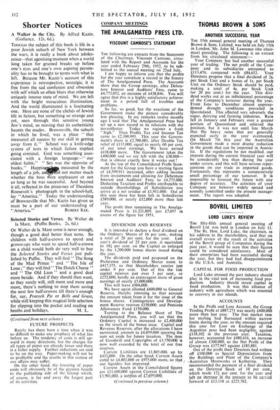Shorter Notices
A Walker in the City. By Alfred Kazin. (Gollancz. 12s. 6d.) THOUGH the subject of this book is life in a poor Jewish suburb of New York between the wars, it is really a book about adoles- cence—that agonising moment when a world long taken for granted breaks up before one's eyes and one's own aspiring person- ality has to be brought to terms with what is left. Because Mr. Kazin 's account of this experience is retrospective, nostalgic, it is free from the sad confusion and obsession with self which so often blurs that otherwise uniquely intense state of mind. We are left with the bright miraculous illumination. And the world illuminated is a fascinating one. Here are none of the clichés of Jewish life in fiction, but something so strange and yet, seen through this sensitive young Jew's mind, so moving that its authenticity haunts the reader. Brownsville, the suburb in which he lived, was a place "that measured all success by our skill in getting away from it." School was a knife-edge system of tests in which failure implied going criminal. God was something asso- ciated with a foreign language—" our oldest habit." "Sex was the opposite of books." Happ measured by the length of a job, d not matter much whether the boss re unpleasant or not so long as he was successful. And beyond it all, reflected in the pince-nez of Theodore Roosevelt's photograph in the school-hall, lay "America." Today the understanding of Brownsville that Mr. Kazin has given us must be a part of our understanding of


































 Previous page
Previous page